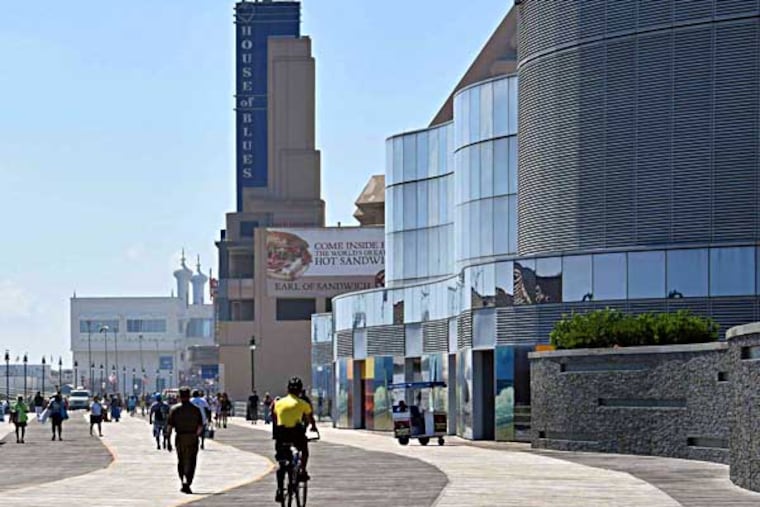LOST IN THE HEDGES
Fund players, not casino experts, behind majority of A.C.'s failed rescues.

Atlantic City has become a place where hedge-fund managers go to lose their shirts.
Three of the four Atlantic City casinos that closed this year (or four of five, if Taj Mahal closes in November) were controlled by hedge funds that suffered deep - but difficult to measure - losses.
By contrast, operators with deep experience with casinos bought Resorts and the former Trump Marina (now Golden Nugget) in 2010 and 2011. Both casinos are showing signs of turning the corner - although the Atlantic City market overall remains far from settled.
Typically, hedge funds invest in troubled casinos by purchasing debt at a steep discount, try to engineer a turnaround, and then sell out at a profit after a relatively short time.
The strategy has been a disaster in Atlantic City - and throughout the industry - in recent years.
"What these guys have shown you: They take over, they know nothing about the business, they hire somebody, and look at the results," said Alan R. Woinski, chief executive of Gaming USA Corp., a consultant in Paramus, N.J.
Woinski said he warned his hedge-fund clients that running casinos was not as simple as it looked.
The hedge funds' investments went like this:
Colony Capital L.L.C., of Santa Monica, Calif., bought the Atlantic Club for about $500 million in 2005, was willing to sell it last year for $15 million in a deal that fell apart, and then lost it last year in bankruptcy. The casino closed in January.
Revel Casino Hotel, which closed Sept. 2, was led out of bankruptcy last year by Chatham Asset Management L.L.C. after the Chatham, N.J., firm and other lenders traded $923 million in senior debt for 100 percent of Revel's now-worthless equity.
Marc Lasry's Avenue Capital Group led a consortium that bought Trump Entertainment Resorts Inc. out of bankruptcy for $225 million in 2010, beating out Carl Icahn, only to file this month for bankruptcy again and, last week, to close Trump Plaza.
The hedge funds either declined to comment or did not respond to a request for comment.
Determining how much hedge funds have lost on their Atlantic City bets is hard to ascertain, because they have ways of paying themselves along the way.
It's also true that without the involvement of hedge funds, it was inevitable that casinos were going to close in Atlantic City after it lost its East Coast casino-gambling monopoly and after operators failed to build a comparative advantage over the convenience of casinos in nearby states.
But which casinos would close was not a given.
Five years ago, Resorts Casino Hotel was on the verge of closing. Colony had purchased it for $144.8 million in 2001 and then saddled it with a $360 million mortgage that it stopped paying in 2008.
Lenders eventually foreclosed and sold Resorts in 2010 for $31.5 million to a company led by the veteran casino executive Dennis Gomes, who helped put it on a path toward recovery before he died in 2012.
Gomes' financial backer, Morris Bailey, a real estate investor, then sold a 10 percent stake in Resorts to a unit of the Mohegan Tribal Gaming Authority, which now runs the casino.
After losing money on operations for five consecutive years, Resorts recorded a small gross operating profit in the quarter ended June 30.
Having a casino operator in charge, as opposed to a financial player, also has made a difference at the former Trump Marina.
Avenue Capital Group sold it in 2011 for $38 million to Landry's Inc., a Houston company that is rooted in the restaurant industry, but entered the casino business with the purchase of two Golden Nugget casinos in 2005.
Landry's turned Trump Marina into a Golden Nugget and invested about $150 million in badly needed renovations.
"They are an operating company," Ken Adams, an analyst in Reno, Nev., said of Landry's, which also owns McCormick & Schmick's and Morton's steak house, among many other chain restaurants. "They try to go into markets where they can make a good purchase, inexpensive in terms of its initial purchase price. They put a significant amount of money into it."
Like Resorts, Atlantic City's Golden Nugget recorded a slim operating profit in the second quarter, after years of losses.
The owner of Landry's, Tilman Fertitta, has a chance to be among the very few outsiders to be successful in the casino industry, Woinski said.
"Everyone else has pretty much left with their wallet lighter and their tails tucked between their legs," he said, "because it's not that easy."
215-854-4651 @InqBrubaker